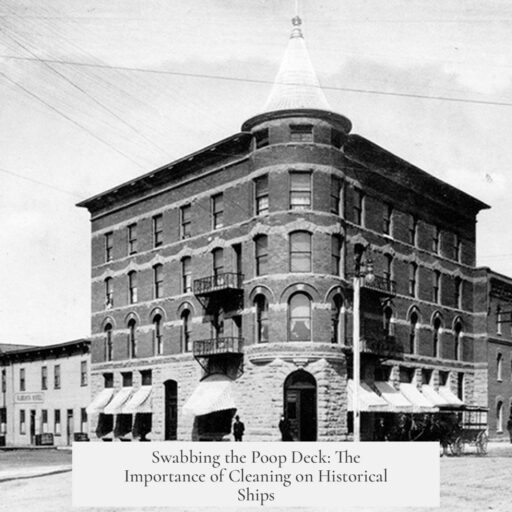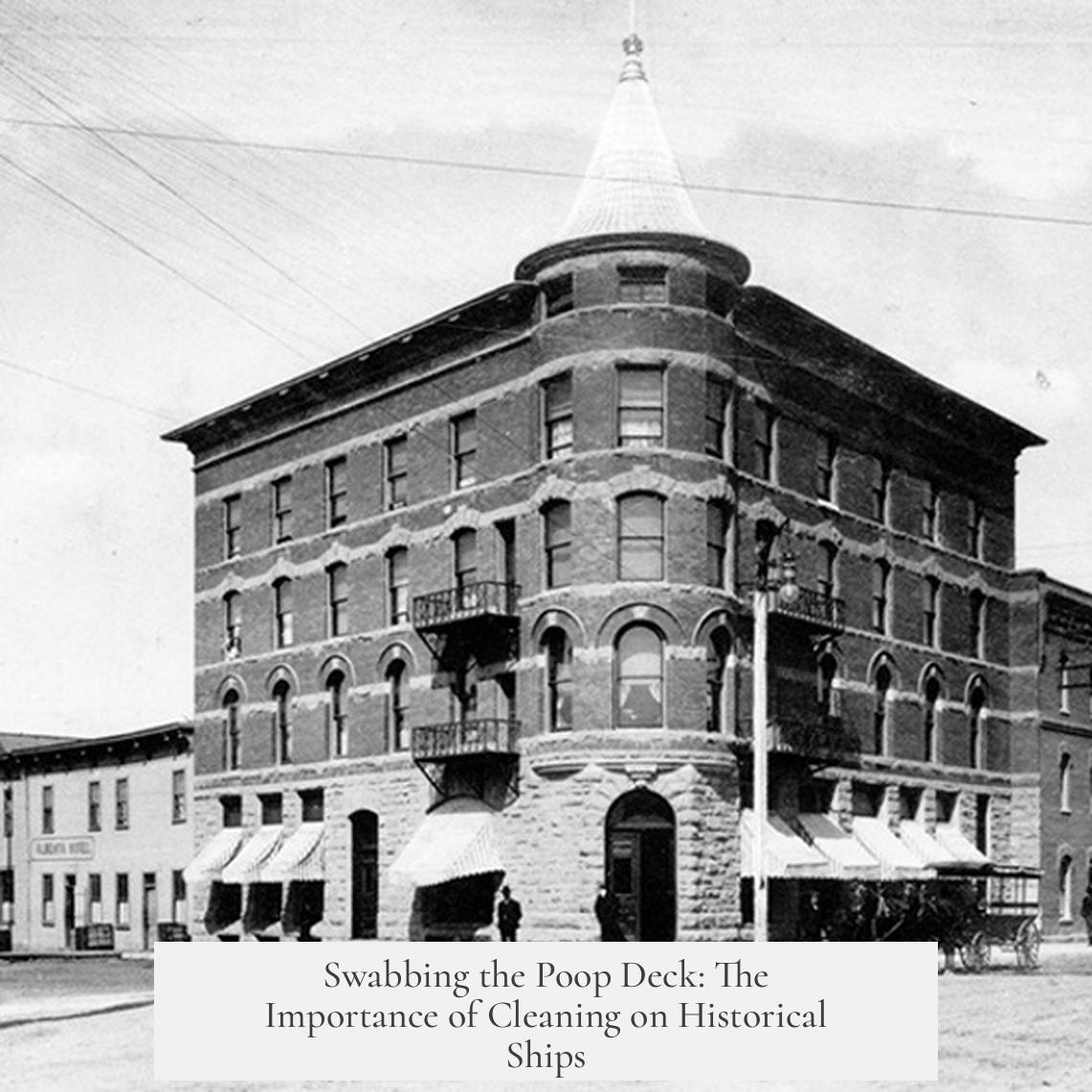Swabbing the poop deck involved regularly mopping the wooden decks of sailing ships, primarily to maintain safety, preserve the ship’s structure, and uphold discipline among the crew.

One crucial reason for swabbing was fire prevention. Gun-decks featured loose gunpowder, which posed a major fire risk. Moistening the decks with seawater helped dampen any spilled powder, reducing the chance of ignition and protecting the ship from devastating fires.
After firing cannons, loose gunpowder accumulated on the deck. Swabbing removed this residue, keeping the deck safe and clean. This practice was vital during naval battles where multiple firings occurred.

Swabbing also slowed wooden deck decay. Wooden planks naturally suffer from decomposition due to moisture and wear. Regular cleaning removed dirt, salt, and debris that could accelerate rotting.
Interestingly, saltwater played a special role in deck preservation. Research on historic vessels, like the Charles W Morgan at Mystic Seaport, found that freshwater increases wood rot, while saltwater helps prevent it. Constantly swabbing decks with seawater thus helped maintain structural integrity and reduced the risk of sailors falling through weakened areas.

The task of swabbing decks also contributed to daily discipline. Sailors had a dedicated chore that kept them active and prevented boredom or idleness. This routine helped maintain morale and order aboard the ship.
- Swabbing reduced fire hazards by dampening spilled gunpowder.
- It cleaned decks after firing to maintain safety.
- Regular swabbing slowed wood decay by applying seawater.
- Saltwater’s preservative effect helped prolong deck life.
- Task kept sailors disciplined and engaged.
Swabbing the Poop Deck – Why Were They Anyways Mopping on Boats?

“Swabbing the poop deck” might sound like a fancy dance move, yet it was a crucial chore aboard sailing ships. So why were sailors mopping decks in the middle of the ocean? The answer combines safety, maintenance, and discipline. Sailors weren’t just tidying up—they were keeping their lives and ship intact.
Imagine yourself aboard a wooden sailing ship braving open seas. You see sailors vigorously scrubbing the poop deck—yes, the rear-upper deck often housing the captain’s quarters. But this act of frequent mopping served far more practical purposes than vanity or routine cleaning.

A Matter of Fire Hazard: Keeping Gunpowder in Check
Back in the Age of Sail and the era of Ships of the Line, fire was the number-one enemy aboard. Gunpowder was everywhere on the decks, especially on gun decks where cannons roared. Any loose powder left to dry was essentially a match waiting to spark a disaster.

Swabbing the decks kept them wet. Moist decks dampened stray gunpowder residues, dramatically reducing the risk of accidental fires. This wasn’t just a precaution—it was a life-saving necessity. In an era when even a small flicker could ignite wooden planks and gunpowder bags, wet decks acted as a crucial barrier.
“During the Age of Sail and usage of Ships of the Line, loose powder on gun-decks was a significant fire hazard and danger. Therefore swabbing decks to keep them moist dampened any powder that fell to the floor and reduced the risk of fire.”
And it didn’t stop with battle. After firing the ship’s guns, a mess of powder dust blanketed the deck. Regular cleaning was essential. The powder powdering the floor wasn’t just unsightly— it was downright dangerous.
Wooden Decks and Saltwater: A Love Story to Prevent Rot
Wooden ships, as beautiful as they were, faced constant decay. Moisture, salt, and sun attack the deck’s wood relentlessly. But here’s a twist: seawater actually helps conserve wood, while freshwater speeds up decay.
This little-known fact, discovered through restoration efforts like those on the Charles W Morgan at Mystic Seaport, explains why sailors frequently swabbed decks with seawater.
“One interesting reason, not mentioned in the other posts, is something they found at Mystic Seaport with the repair of the Charles W Morgan: freshwater makes wooden things rot, saltwater keeps wooden things from rotting. If you keep swabbing the decks with seawater, you reduce the chances of falling through them.”
More than just preservation, keeping decks salted and moist prevented sailors from accidentally breaking through weakened, rotten planks. Imagine the horror of falling through the floor to the lower decks or the sea below!
Discipline and the Value of Purposeful Chores
Swabbing wasn’t just functional; it was a strict part of naval discipline. Sailors who were bored or idle could slip into dangerous laziness, recklessness, or even mutiny. A mop in hand meant purpose and order.
Assigning sailors the task of swabbing decks gave them daily goals and helped maintain a sense of responsibility and routine.
“Regular cleaning of wooden decks slowed down decomposition and was also an important part of discipline, giving a sailor a task to achieve instead of succumbing to boredom or idleness.”
It was a clever way to keep morale up and chaos down. An engaged crew was a safer crew, with less chance of accidents or misbehavior. So when you hear “swabbing the deck,” picture well-ordered sailors making their ship safer and stronger with every wipe.
Not Just the Poop Deck: The Entire Ship Was On Deck Duty
Though we often spotlight the poop deck because of its colorful name, swabbing was a shipwide affair. Gun decks, quarterdecks, and main decks all saw their share of scrubbing.
Each area served different functions but shared the same whitewashed goal: fire prevention, structural preservation, and disciplined routine.
Lessons From the Past: Could Ships Have Saved Money and Lives?
Reflecting on the importance of swabbing reveals much about the realities of life at sea. Without this diligent, often backbreaking work, wooden ships risked fire, decay, and chaos.
Modern shipbuilders and historians can learn from these practices. Maintenance routines that emphasize cleanliness and safety have been vital across centuries. Whether on a 19th-century ship of the line or a contemporary naval vessel, discipline and safety culture remain pillars of operational success.
Wrapping Up the Mop Game
So next time you come across the phrase “swabbing the poop deck,” remember it’s not just about tidying a funny-sounding corner of a ship. It’s about survival, ship maintenance, and keeping sailors vigilant.
The act of wet mopping with seawater was a multi-purpose strategy that saved lives by preventing fire, reducing wood decay, and instilling discipline. No wonder it became an iconic naval routine.
What does your daily routine do for you? Could something as simple as swabbing your own metaphorical “deck” reduce risks and help you thrive? Maybe there’s wisdom in old sailors’ wet mop tales after all.
| Reason for Swabbing | Explanation |
|---|---|
| Fire Hazard Reduction | Dampening loose gunpowder to prevent accidental fires during combat and daily life. |
| Cleaning After Gun Use | Removing loose powder residue following cannon discharge to maintain safety. |
| Prevention of Wood Rot | Using saltwater to delay decomposition and preserve wooden deck integrity. |
| Maintaining Discipline | Providing sailors with purposeful tasks to avoid idleness and boost order. |
Sources:
- William Quereau Force, Army and Navy Chronicle, and Scientific Repository, Volume 11 (1840)
- Admiral Philip Patton, Strictures on Naval Discipline and the Conduct of a Ship of War (1810)
Why was swabbing decks with seawater important for wooden ships?
Swabbing decks with seawater helped preserve the wood. Freshwater causes wood to rot faster. Saltwater slows down decay, keeping decks stronger and safer over time.
How did swabbing reduce fire hazards on ships?
Swabbing kept gunpowder damp on the decks. This lowered the chance of accidental fires, especially on gun decks where loose powder was common.
What role did cleaning decks play in sailor discipline?
Cleaning gave sailors a regular task. It prevented boredom and idleness, helping maintain order and discipline aboard the ship.
Why was it necessary to clean decks after using the ship’s guns?
After firing, loose gunpowder remained on deck. Cleaning it up was essential to reduce fire risks and keep the ship ready for action.
Did swabbing have any effect on the ship’s structure?
Yes. Keeping decks wet with saltwater helped protect wood from rotting. This extended the life of the ship’s wooden parts.




